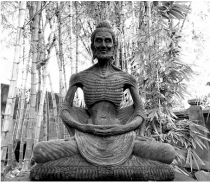So…well…enjoy!
I’ve been sitting on this cushion
Meditating for nine days straight
I’ve been sitting on this cushion
Meditating for nine days straight
Sitting, watching, waiting
To see my Original Face
Everywhere I go
I’m working on that koan Mu
Everywhere I go
I’m working on that koan Mu
I ain’t seen nothing but cows, baby
I got them old Kensho Blues
I’ve been counting my breath
Doing shikantaza too
Walking meditation
Everything else I’m supposed to do
I’m studying sutras
Keeping the precepts day and night
Ain’t nothing happening at all
Am I even doing this right?
Oh No!
That old koan Mu
I ain’t seen nothing but cows, baby
I got them old Kensho Blues
I’ve been to Zhaozhou’s Bridge
Cut Nanquan’s Cat in half
A Dried Shitstick in my left hand
In my right Three Pounds of Flax
I Rolled Up the Blinds
Put Snow in a Silver Bowl
I even took a step off the top of a
One-hundred-foot Pole!
Oh No!
That old koan Mu
I ain’t seen nothing but cows, baby
I got them old Kensho Blues
And I got fed up…
So I got myself a job in a coalmine
Decided kensho just wasn’t worth the fight
I said I’m working in a coalmine
Kensho just wasn’t worth that fight
Check this out:
I don’t need a lantern when I’m down there
Because now everything is shining with light
There’s light in the gutter
There’s light in the sink
It’s flowing like a river
C’mon now – take a drink!
There’s light in everyone’s face
Shooting out of our toes
It’s in the laughing & crying & living & dying
And in the Poconos!
Oh Yes!
That old koan Mu
Now I’m dancing with those cows, baby
So glad I got the Kensho Blues
Everybody!
Now we’re dancing with those cows
So glad we got the Kensho Blues


 RSS Feed
RSS Feed
